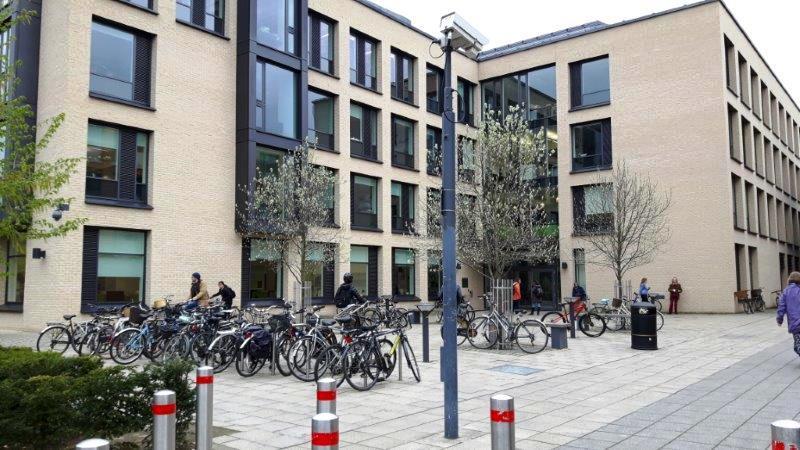Breadcrumb
Human, Social and Political Sciences
The Human, Social and Political Sciences (HSPS) course is a three-year degree that offers a broad background in the human, social, and political sciences. Subjects include politics and international relations, social anthropology or sociology. This course allows students the flexibility to explore their interests across these subjects whilst still gaining the specialist knowledge to ensure they leave as experts in their discipline(s). For more information, please see the University and Faculty websites, as well as this video to find out what a day in the life of a Cambridge HSPS student is like.
The three main themes within this subject are:
1. Politics and International Relations
2. Sociology
3. Social Anthropology
There is however scope for mixing elements from all or specialising in one from the very first year. Either way, you have the option to take individual options in other subjects as well as your primary subject. The Directors of Studies at the College will help you to work out a path through the degree that best suits you as an individual; this means supporting you in seeking to develop your intellectual potential through your choices. The second and third year involves advanced study in either one or two specific subjects. You will graduate from Cambridge having specialised in one or two subjects.
HSPS at Peterhouse
Peterhouse has a tight knit vibrant community of scholars interested in the subjects that make up the HSPS course. There are a number of thriving student-led societies that are often of interest to HSPS students, for instance, the Politics Society, the History Society and the feminist 'Beard' society. These 'fireside chats' provide an intimate venue for learning, conversations and debates about some of the most pressing issues in our time with some of the leading figures in their respective field. The College has excellent facilities, including a well-stocked library. Peterhouse is well located between the two main sites where HSPS teaching takes place.
Peterhouse has two fellows that serve as Directors of Studies for HSPS. Dr Holly Porter is an Associate Professor in the Department of Politics and International Relations and Deputy Director of the Centre for Gender Studies. Prof. John Robb, Professor of European Prehistory, is Director of Studies for the Part IIs focusing on Social Anthropology. Dr Porter and Prof. Robb host a number of social gatherings each year to bring together people from across all parts of the college interested in the subjects of HSPS from undergraduates to postgraduates to fellows.
Course requirements
No previous study of a social science is necessary. No specific A-Level (or equivalent) subjects are required.
It may be helpful if your subjects relate to the area of the course in which you are hoping to specialise, e.g. History or Sociology for Social Anthropology etc. However, most subjects are relevant, and a mix of science and arts subjects is welcomed. HSPS is a broad course, so a range of subjects will provide a good background – from Mathematics to social sciences (e.g. Psychology, Politics and Geography) and arts (e.g. English, History and modern languages).
We are looking for candidates with an outstanding academic track record, strong academic interests and a keen intellectual interest in the course. We do not expect you to know exactly what you wish to do when you apply. It is more important that you show an intellectual curiosity and a passion for understanding the world than that you have any particular set of subject interests.
The application process
We ask candidates to submit two examples of recent written work. Applicants will also sit a written assessment. This assessment is college registered so applicants do not need to register in advance.
Candidates should expect two interviews. Both of these will be subject based. No special preparation is required for the interviews, although applicants should ensure that they are fully familiar with all material that has been provided as a part of the application process (e.g. their Personal Statement and submitted written work). In addition, candidates are likely to be asked questions about their school or college work. More specific questions may focus on a wider exploration of intellectual matters and the candidates academic background and interests, as well as their awareness of, topics covered by the HSPS course.
Typical conditional offers
Our typical conditional offer for HSPS is A*AA at A level. IB offers are usually for a minimum of 41-42 points, to include 776 or 777 at Higher level in relevant subjects. Offers are designed to be realistic, taking into account individual circumstances, and to reflect potential and likely levels of achievement. Most of those who receive offers will attain the grades required.
Further resources and reading
Students are not expected to have read certain things and we aren’t looking to test knowledge acquired from specific books. Reading, however, is central to learning and broadens anyone’s horizons. Applicants can also get a good sense of what some of the subjects available in HSPS are like by reading some of the books that students encounter while studying these subjects at Cambridge. Here you can find a suggested reading that might give you a flavour of the different types of subjects in the HSPS course. If you want to pursue independent reading from these lists, don't try to cover them all. Pick the subject or several subjects that interest you and read from that list.
POLITICS
Bernard Crick, Democracy: a very short introduction Oxford; Oxford University Press, 2002.
John Dunn, Western political theory in the face of the future revised edition; Cambridge: Cambridge University Press, 1992.
Raymond Geuss, History and illusion in politics; Cambridge University Press, 2001.
David Runciman, The politics of good intentions: history, fear and hypocrisy in the new world order; Princeton University Press, 2006.
INTERNATIONAL RELATIONS
Chris Brown and Kirsten Ainsley, Understanding international relations (4th edition); Palgrave Macmillan, 2009.
Jussi Hanhimaki, Joseph A. Maiolo, Kirsten Schulze, and Anthony Best, An international history of the twentieth century and beyond (2nd edition); London: Routledge, 2008.
Henry Kissinger, Diplomacy; London: Simon & Schuster, 1994.
James Mayall, World politics: progress and its limits; Cambridge: Polity, 2000.
Adam Watson, The evolution of international society; Routledge, 1992.
SOCIAL ANTHROPOLOGY
Lila Abu-Lughod, Veiled sentiments: honor and poetry in a Bedouin society Berkeley and London; University of California Press, 1986.
Rita Astuti, Jonathan P Parry, and Charles Stafford (editors), Questions of anthropology; Oxford, 2007.
Tom Boellstorff, Coming of age in second life; Princeton, 2008.
T.H. Eriksen, Small places large issues: an introduction to social and cultural anthropology (3rd edition); London: Pluto Press, 2010.
J. Hendry, An introduction to social anthropology: sharing our worlds; Basingstoke: Palgrave Macmillan, 2008.
Karen Ho, Liquidated: an ethnography of Wall Street; Raleigh: Duke University Press, 2009.
Adam Kuper, Anthropology and anthropologists; Routledge, 1983.
J. Monaghan, and P. Just Social & cultural anthropology: a very short introduction; Oxford, Oxford University Press, 2000.
SOCIOLOGY
J.C. Alexander and K. Thompson, A contemporary introduction to sociology: culture and society in transition; London: Paradigm Publishers, 2008.
Zygmunt Bauman, Thinking sociologically (2nd edition); Wiley-Blackwell, 2001.
R W Connell, Gender (2nd edition); Polity, 2009.
R. Crompton, Class and stratification (3rd edition); Cambridge: Polity Press 2008.
A. Giddens, Sociology (6th edition); Cambridge: Polity Press, 2009.
Richard Sennett, The corrosion of character; W W Norton, 1999.
Anthony Smith, Nations and nationalism in a global era; Polity, 1995.
BIOLOGICAL ANTHROPOLOGY
R Boyd and J. Silk, How humans evolved (5th edition); New York: W. W. Norton & Co. 2009.
R. Dawkins, The selfish gene (3rd edition); Oxford: Oxford University Press 2006.
F de Waal, Tree of origin: what primate behaviour can tell us about human social evolution; Cambridge MA: Harvard University Press 2001.
M. Ridley, Nature via nurture: genes, experience and what makes us human; London: Fourth Estate 2003.
Robert Boyd and Joan Silk, How humans evolved (5th edition); W.W. Norton & Co., 2009.
ARCHAEOLOGY
B. Cunliffe, Europe between the oceans 9000 BC-AD 1000; New Haven, Yale University Press 2008.
A. Colin Renfrew and Paul Bahn, Archaeology: theories, methods and practice (6th edition); Thames & Hudson, 2012.
C. Scarre (ed.), The human past; London: Thames and Hudson 2005.
R. Wenke and D.I. Olszewski, Patterns in prehistory (5th edition); Oxford: Oxford University Press 2006.
PSYCHOLOGY
Michael W. Eysenck and Mark T. Keane, Cognitive psychology: a student's handbook; Psychology Press, 2010.
C. Fraser and B. Burchell, Introducing Social Psychology; Oxford: Polity, 2001.
Richard J. Gerrig, Philip Zimbardo, Frode Svartdal and Tim Brennen, Psychology and life; Allyn & Bacon, 2012.
Michael Hogg and Graham Vaughan, Essentials of social psychology; Prentice Hall, 2010.
Susan Nolen-Hoeksema, Willem Wagenaar, Barbara Fredrickson and Geoffrey R. Loftus, Atkinson and Hilgard's introduction to psychology; Cengage Learning, 2009.
H Rudolph Schaffer, Key concepts in developmental psychology; SAGE, 2006.


